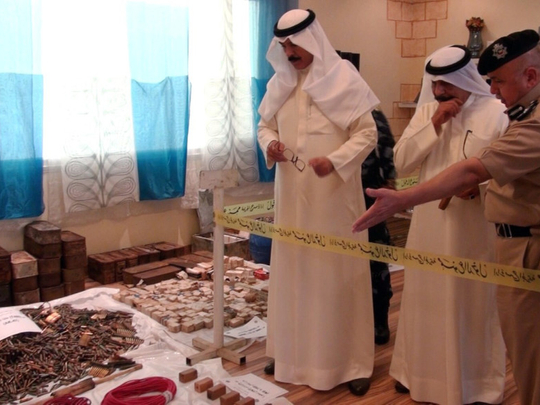
Manama: A huge arms cache seized in Kuwait last week was smuggled into the country from Iran, two Kuwaiti newspapers reported on Sunday.
The Interior Ministry said on Thursday authorities had found ammunition, explosives, weapons and grenades in holes dug under houses in an area near the Iraqi border. Three men who owned the houses were detained.
Al Anba newspaper reported at the time that the weapons had been smuggled across the border from Iraq for use by members of an Iranian-backed Hezbollah cell.
But Al Rai and Al Qabas dailies, citing unnamed sources, reported on Sunday that the weapons had been brought into Kuwait by sea from Iran. They quoted the sources as saying that the new information had come from confessions made by the detainees during interrogation.
Al Qabas said the number of suspects held had risen to 13.
“The suspects have disclosed that there is a direct Iranian line in supplying weapons to Kuwait by sea,” Al Rai said.
The Interior Ministry declined to comment.
Another newspaper, Al Jarida, said Iranian Revolutionary Guards had trained members of the cell a year ago, along with citizens from Saudi Arabia and Bahrain, on the use of weapons and explosives, at an unnamed Red Sea island.
It said the trainees had travelled to the island through a port controlled by Yemeni Al Houthis, an Iranian-linked group which controls much of northern Yemen.
Kuwait has been on alert since a suicide bomber killed 27 people in an attack on a Shiite mosque in the capital, Kuwait City, on June 26.
The interior minister said in June it was at war with hardline militants, who officials said were trying to stoke sectarian strife in a state where the two Muslim sects have traditionally coexisted peacefully.
Ties between Iran and its Gulf Arab neighbours are strained by suspicions that Tehran is trying to extend its influence into Arab countries including Syria, Iraq and Yemen.
Meanwhile, Kuwaiti security authorities said they have added three suspects to the investigation.
The suspects include a university professor, a fire station officer and the son-in-law of the main suspect, Kuwaiti daily Al Nahar reported on Sunday.
All three have denied any links with the terror cell, sources told the daily, adding that the authorities were planning to question more suspects, including five foreigners who worked in the money-exchange sector.
A report carried by Al Anba daily in Kuwait City said that a technical analysis of the weapons seized in the cache indicated they were not leftovers from the 1990 Iraqi invasion of Kuwait as claimed by some suspects during their questioning.
Sources told the daily that the main suspect, a diver, used his professional position to bring ashore the weapons placed by smugglers in the sea and that he relied on the GPS system.
A list of Lebanese nationals suspected of involvement in the smuggling of weapons has been drawn up by the interior ministry and will be sent to Beirut for further investigations.
The first three members of the cell were arrested on Thursday after the authorities discovered an arsenal of weapons, ammunition and explosives.
Security forces found RPG shells and an amount of ammunition on a farm owned by the first terrorist, born in 1968. Three firearms and another amount of ammunition were found at the house of the second suspect born in 1981. Three bags of weapons, ammunition and various explosive materials were seized from the house of a third suspect born in 1980, reports in Kuwait said.
According to the Ministry of Interior, the three confessed that they had joined a terrorist organisation and led the security forces to where the weapons and the explosives were hidden.
On the farm and in the three houses, the forces seized 19 kg of ammunition, 144 kg of TNT, PE4 and other explosive materials, three RPGs, 204 grenades and detonators.
Several lawmakers have called for tougher measures and a zero-tolerance policy in dealing with acts of terrorism, with some MPs saying that the Kuwaiti citizenship should be revoked from all found guilty of plotting against the security and stability of the country.
With inputs from AFP











